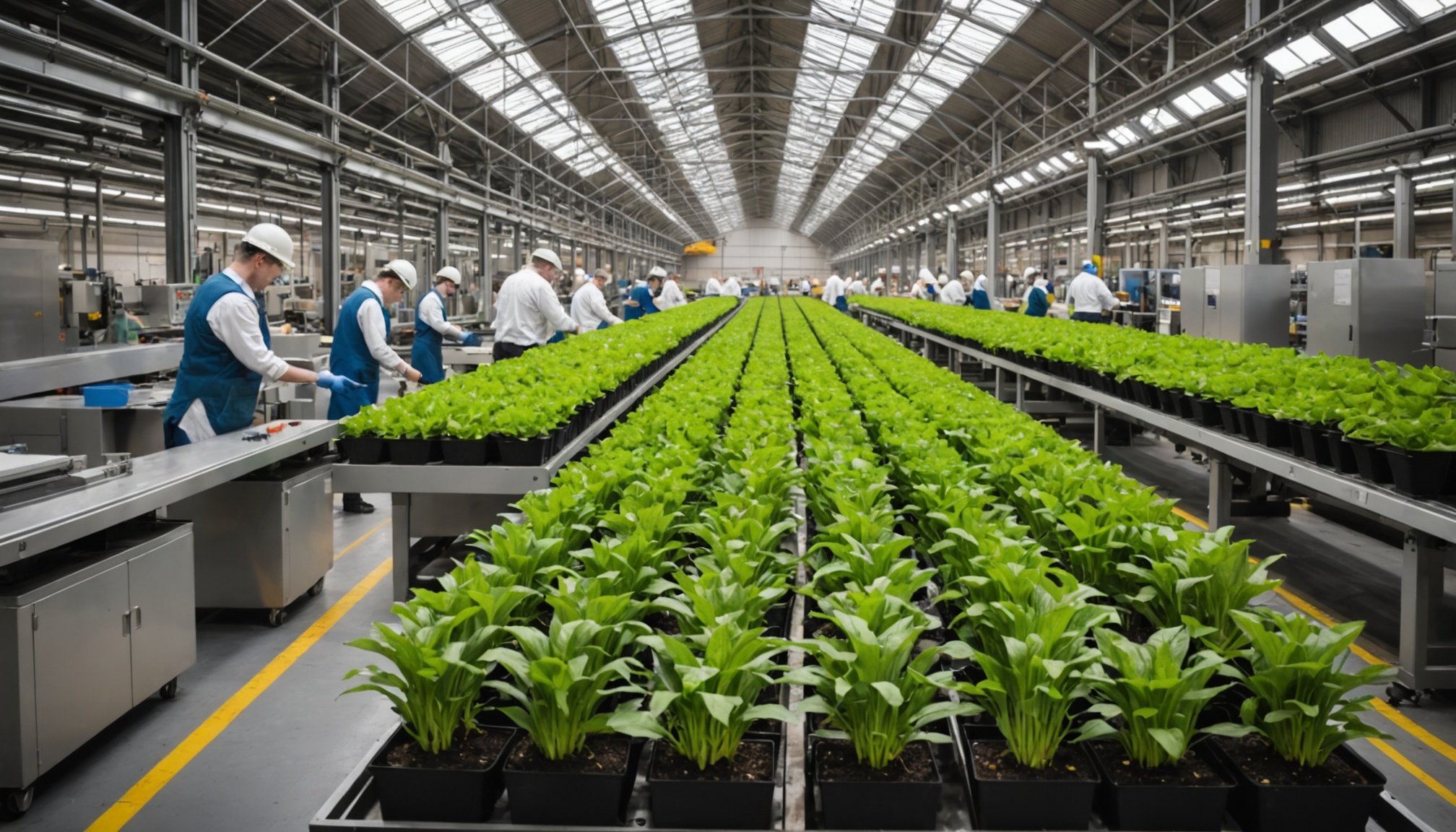Overview of Sustainable Manufacturing Practices in the UK
Sustainable manufacturing is a critical concern in the UK, driven by both environmental needs and consumer demand. UK regulations and policies play a substantial role in shaping sustainable practices. For instance, manufacturers must adhere to stringent guidelines, such as the Zero Waste Scotland initiative, which promotes reducing landfill waste. These regulations are not merely bureaucratic hurdles; they serve the fundamental purpose of minimizing the environmental impact of industrial activities.
Traditional manufacturing processes, known for their considerable environmental impact, often lead to substantial CO2 emissions and resource depletion. By contrast, sustainable manufacturing prioritizes decreasing carbon footprints and utilizing resources efficiently. Under UK regulations, manufacturers are incentivized to innovate in their processes, thus limiting ecological damage and promoting sustainability.
In the same genre : Transforming Menus with AI: Top Strategies for UK Restaurants to Boost Culinary Creativity
The transition towards sustainable manufacturing also necessitates comprehensive strategies, including employing renewable energy and optimizing waste management. These practices align with UK policies encouraging a circular economy, where waste is minimized, and resources are continually reused and recycled. Consequently, sustainable manufacturing practices not only comply with UK regulations but also significantly mitigate traditional manufacturing’s detrimental environmental impact. This shift is essential for fostering a more sustainable industrial future globally.
Key Strategies for Sustainable Production
In the transition to sustainable production, manufacturers prioritize resource efficiency and waste reduction. This involves optimizing processes to minimize material usage and energy consumption. For instance, embracing lean manufacturing techniques can significantly cut waste in production lines. Manufacturers are also focusing on advanced eco-friendly practices like recycling wastewater and reusing by-products in new products.
Topic to read : Revolutionizing UK Farming: Harnessing IoT to Boost Crop Monitoring
Implementing renewable energy sources is another cornerstone of sustainable manufacturing. Factories are increasingly adopting solar panels, wind turbines, and other renewable technologies to power operations. This shift not only reduces dependency on fossil fuels but also aligns with the increasing demand for cleaner production processes.
Collaboration with suppliers is crucial for ensuring sustainable sourcing. By establishing partnerships with eco-conscious suppliers, manufacturers can ensure that raw materials are sourced responsibly and align with sustainable production values.
- Resource efficiency: Minimizing waste, optimizing production
- Renewable energy sources: Adopting solar, wind power
- Supplier collaboration: Ensuring eco-conscious sourcing
Through these strategies, manufacturers are able to reduce their environmental impact while maintaining profitability. Businesses not only enhance their sustainability credentials but also meet evolving consumer expectations for environmentally responsible products.
Case Studies of Successful Sustainable Manufacturing
Case studies around sustainable manufacturing showcase how UK manufacturers lead the way with innovative best practices. Highlighting pioneering companies, these stories serve as roadmaps for others striving for sustainability.
Highlighting Leading UK Manufacturers
Several UK manufacturers have excelled in embedding sustainability into their operations. One standout example is Unilever, which has integrated cutting-edge resource efficiency techniques, significantly reducing waste and energy use at its facilities. Another leader, Jaguar Land Rover, has championed sustainability through investment in renewable energy and closed-loop recycling systems, enhancing their eco-friendly practices.
Lessons Learned from Sustainable Transitions
The transition to sustainable manufacturing is not without challenges, yet these successful manufacturers have uncovered valuable lessons. Many have realised that prioritizing eco-friendly practices requires an upfront investment in technology and training. However, the long-term savings and enhanced brand image offset these initial costs, demonstrating the practicality and profitability of sustainable manufacturing.
Impact on Community and Environment
The success of these manufacturers extends beyond their processes. By adopting sustainable manufacturing practices, they positively impact local communities and ecosystems, creating jobs, reducing pollution, and enhancing biodiversity. These case studies illustrate how sustainability in manufacturing propels not only industry standards but also community welfare.
Tools and Technologies Supporting Sustainable Manufacturing
In the current era, technological advancements are playing a pivotal role in promoting sustainable manufacturing practices. One significant area of development is the integration of Industry 4.0 technologies, such as Artificial Intelligence (AI) and the Internet of Things (IoT). These technologies provide manufacturers with enhanced capabilities for monitoring and optimising energy use, resource management, and overall production efficiency.
AI in manufacturing can predict equipment maintenance needs, thereby reducing waste and preventing unexpected downtime. This proactive maintenance approach ensures maximum resource efficiency, aligning with sustainability goals. Meanwhile, the IoT enables real-time data exchange between devices, allowing for more informed decision-making regarding resource allocation and energy consumption.
Apart from these technologies, innovative software tools are emerging that empower companies to track and report their sustainability efforts. These tools provide insights into energy use, greenhouse gas emissions, and waste production, assisting businesses in enhancing their sustainability performance.
Looking ahead, the future of manufacturing technology is set to be deeply intertwined with sustainability. Technological innovation will continue to drive sustainable practices, offering manufacturers robust solutions to meet environmental challenges and regulatory demands while optimising their operational efficiencies.
Understanding Market Trends for UK Marketing Agencies
In today’s dynamic market, UK marketing agencies must focus on shifting market trends, particularly the growing consumer inclination towards eco-friendly products. Recent studies reveal a significant increase in consumer demand for sustainable alternatives, pushing brands to adopt greener practices. Understanding these trends is crucial for agencies aiming to cater to evolving preferences effectively.
One critical factor driving change is consumers’ increased access to vast information, resulting in more informed choices. Consequently, agencies need to employ sophisticated data analytics tools to gain deep insights into consumer behavior. These tools can help identify patterns and preferences, enabling agencies to devise strategies that resonate well with sustainability-conscious audiences.
Moreover, the rise in digital strategies has opened new avenues for engaging consumers. Eco-friendly themes in digital marketing, such as promoting brands’ sustainability efforts, have become increasingly prevalent. This trend is expected to continue as brands work to solidify their sustainability credentials.
Marketing agencies must stay adept in technological and strategic innovations to thrive in this space, leveraging data insights and digital platforms to meet client needs while nurturing consumer engagement through authentic, sustainability-focused narratives.
Understanding Market Trends for UK Marketing Agencies
In an evolving market, UK marketing agencies must adapt to market trends driven by a surge in consumer demand for eco-friendly products. This growing preference is reshaping consumer behaviour, encouraging brands to embrace greener practices. Agencies seeking to remain relevant need to harness sophisticated data analytics tools. These tools offer insights into consumer behaviour, enabling agencies to tailor strategies that resonate with conscious consumers.
A vital component of understanding market trends is identifying shifts in consumer preferences. This is largely due to increased access to information, empowering consumers to make more informed choices regarding sustainability. To effectively cater to these preferences, agencies must delve deep into consumer behaviour patterns. Advanced data analytics facilitate this process by uncovering actionable insights, ultimately guiding effective marketing strategies.
Digital strategies play an increasingly critical role, opening new pathways to engage consumers authentically. With sustainability-themed campaigns becoming increasingly popular, digital platforms offer brands opportunities to showcase their eco-friendly efforts. As trends shift towards sustainability, marketing agencies must leverage technology and innovative strategies to meet client needs and engage consumers through meaningful, sustainability-focused narratives. This ensures they remain competitive and relevant in a rapidly changing market.
Practical Examples of Effective Marketing Approaches
Examining case examples of successful marketing strategies can reveal actionable insights into effectively engaging consumers and driving agency growth.
Campaigns That Resonate with Consumers
The power of sustainability-focused campaigns lies in their ability to connect authentically with the audience. Consider the example of a UK cosmetics brand that launched a fully transparent supply chain initiative, showcasing its ethical sourcing and eco-friendly packaging. This marketing success story resonated with consumers, leading to increased brand loyalty and sales. By aligning product offerings with consumer values, brands tap into a growing market segment prioritizing sustainability.
Innovative Engagement Techniques
Innovative methods are crucial for sustaining consumer interest. Interactive digital content and personalised experiences are at the forefront of engaging today’s audience. A campaign by a fashion retailer used virtual reality to offer consumers an immersive journey of their clothes’ journey from raw material to finished product. Such engagement techniques not only captivate but also educate the consumer.
Measuring Success in Marketing Efforts
To gauge the effectiveness of these strategies, businesses utilise metrics and KPIs like consumer engagement rates, conversions, and customer feedback. By continuously measuring these indicators, agencies can refine their approaches, ensuring their campaigns remain impactful and aligned with evolving market demands. Such precision in evaluation helps maintain agency growth and relevance.











